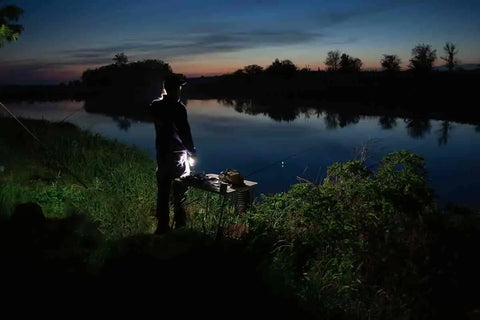Tips on how to fish at night
Whether you’re a seasoned angler looking to try something new, or simply can’t imagine anything better than the tranquility of casting a line as the sun sets, night fishing has something to offer everyone. It takes some planning, but the experience you’ll get to take home with you is well worth the effort.

How to go night fishing is more about planning and preparing your trip than getting to grips with a specific fishing technique. Staying organized is one of the most important things you can do on your trip!
After all, you don’t want to be scrambling around and tripping over some rods and reels while you’re trying to reel in a fish that’s bitten.
You can go night fishing either on foot or by stepping aboard a vessel. For beginners, sticking to shallow waters that can be accessed without a boat is both easier and safer than trying to navigate your own vessel. If you’re set on fishing from a boat, we’d recommend fishing with local and experienced charter captain or guide.
Here are some of our top tips:
- Check your gear the day before you go.Taking the time to rig up your rods, re-tie any loose knots, and fix up any potential issues such as re-spooling a reel a day or two before you embark on your trip will make the world of difference. Rigging up your gear using a headlamp or torch can be finicky and frustrating, so save yourself some time by rigging up before you set out.
- Time your trip wisely. In general, fishing during the night is most productive between 8:00 p.m. and 3:00 a.m. Clear and calm nights are the best time to plan your trip, as opposed to when it’s windy and the waters are rough. In clear, calm waters, fish usually become active once the sun has completely set.
- Arrive at your spot before the sun sets.This will allow you to set up your gear and familiarize yourself with your surroundings while there’s still some natural light around.
- Look for light.Docklights, pier lights, bridge lights…bait fish flock around underwater lights, and chances are your target species isn’t far behind. These types of lighting can help you get more of an insight into what’s happening beneath the water, as well as guide your way.
- Be prepared to move on. Although you want to keep your movements to a minimum when night fishing, it’s important to know when the fish just aren’t biting and cut your losses. Experienced night fishers suggest giving a specific spot 90 minutes, and if there’s no action, move on.

What techniques can use
Generally, you can use any technique that you’d implement during the daytime. However, the techniques that generally work best when night fishing are those that rely on touch and movement, rather than sight.
For example, spin casting or bottom fishing, where the rod is in your hand and you’re more likely to notice sudden movement, can be easier for beginners to master than, say, trolling or chumming, where you initially rely on sight to notice a bite.
Weirdly, techniques such as bow fishing and gigging, which require precision, are excellent night fishing options! This is because you’ll usually be traveling on a vessel with special lights to illuminate the shallow waters below you. Similarly, ice fishing can be effective during the nighttime, but it’s important to choose a spot during the daytime where lots of fish hang out.
In order to make your chosen technique more effective under the cover of darkness, there are some small changes you can make. Opt for glow-in-the-dark lures and lines, use cut bait or fish oils to enhance the scent of your chosen bait fish, and make good use of rattle lures to entice your fish.

What should bring when fish at night
The fishing gear you’ll need to bring along actually doesn’t differ too much from what you’d take on a daytime trip. What matters the most is knowing what you want to target and what technique you’ll be using, as this’ll help you decide on the terminal tackle and rod setup you should bring along.
There are some additional pieces of equipment, however, that you’ll want to bring along to make your trip goes as smoothly and stress-free as possible. Check our list to make sure you have everything you need before you head out:

✔ Rechargeable head lamp. Having at least one light source is critical when it comes to being out on the water at night. Use a rechargeable head lamp and you’ll have your hands free for fishing.
✔ Torch and batteries. As above! Bring an additional light source for backup. Torches also provide a “moveability” that head lamps do not.
✔ Insect repellant spray. You won’t have to worry about sunburn when fishing at night, but you’ll have to trade it in for bug bites. Bug spray is a must, especially if you’re fishing in marshy or freshwaters.
✔ Weather-appropriate clothing. Temperatures drop at night anyway, so you can expect your nighttime expedition to be colder than a daytime trip. Keep an eye on the forecast and bring along waterproof gear and a change of clothes if necessary.
✔ First aid kit. It’s unsurprisingly easy to cut yourself on hooks, lines, and other fishing gear when you don’t have natural light to aid you. A first aid kit is a must during any fishing trip, especially so at night.
✔ A lifejacket or high-visibility jacket. If you’re fishing in deep waters or from a boat, a life jacket is essential. Otherwise, you can bring along a high-visibility jacket to make your presence known to other people who may be around.
